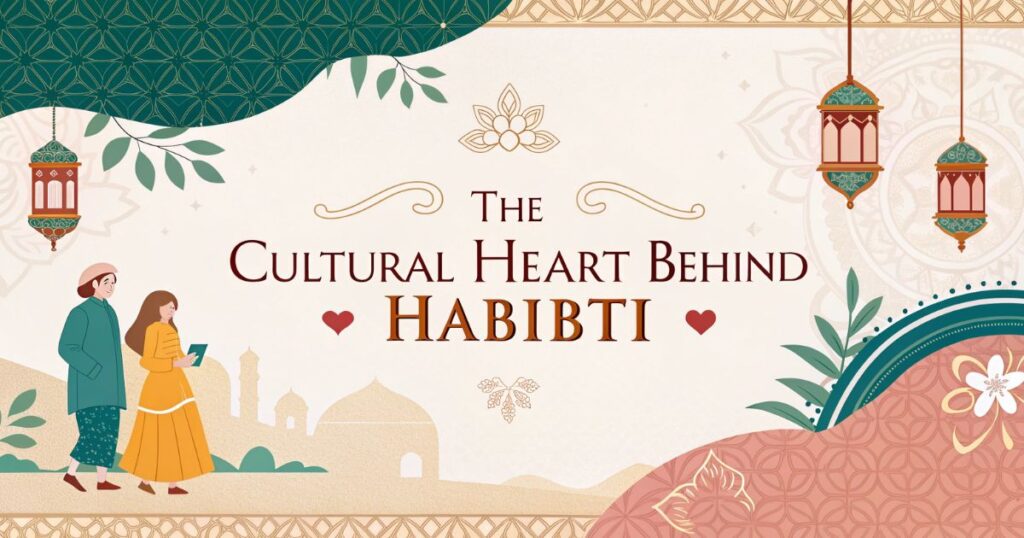Habibti has captured hearts across America, becoming one of the most cherished Arabic endearments in multicultural relationships. This beautiful word carries centuries of emotional depth while bridging cultural gaps in our diverse society. Let’s explore everything you need to know about this powerful expression of love.
What Does Habibti Actually Mean?
Habibti translates directly to “my beloved” or “my dear” in English. The word stems from the Arabic root “hubb,” meaning love, combined with the possessive suffix “-ti” that indicates feminine ownership.
This endearment specifically addresses women and girls. When speaking to males, Arabic speakers use “habibi” instead. Think of it as Arabic’s built-in gender recognition system.
The pronunciation varies slightly across different Arabic-speaking regions. Lebanese speakers might soften the “b” sounds, while Egyptian Arabic delivers it with more emphasis on the middle syllable.
Moroccan and Gulf dialects add their own melodic twists. However, the emotional core remains unchanged regardless of accent.
The Cultural Heart Behind Habibti

Arabic culture places tremendous value on emotional expression through language. Unlike English’s more reserved approach, Arabic speakers freely share feelings through everyday conversation.
Mothers commonly call their daughters “habibti” during tender moments. This usage carries no romantic implications—it’s pure maternal love expressed linguistically.
In romantic relationships, the word holds significant weight. Couples reserve “habibti” for intimate conversations, making it far more meaningful than casual terms like “babe” or “honey.”
Friendship boundaries become crucial here. Close female friends might exchange “habibti” playfully, but context determines appropriateness.
Real-World Usage
Social media platforms have exploded with habibti content. TikTok creators teaching pronunciation have garnered millions of views, while Instagram couples showcase cross-cultural romance.
Celebrity influence accelerates this trend. Pop stars and influencers casually drop “habibti” in interviews, normalizing Arabic endearments for mainstream audiences.
Dating apps reflect America’s growing cultural curiosity. Profiles increasingly feature Arabic phrases as conversation starters, though understanding remains limited.
Workplace diversity initiatives now include cultural appreciation sessions. Companies recognize that understanding terms like “habibti” fosters inclusive environments.
Common Habibti Synonyms and Alternatives
Arabic alternatives offer various emotional intensities:
- Rouh means “my soul”—deeper than habibti
- Azizi translates to “my dear”—more casual
- Hayati means “my life”—extremely passionate
- Habib albi says “love of my heart”—ultimate intimacy
English equivalents include beloved, sweetheart, darling, and honey. However, none capture habibti’s cultural richness.
Spanish speakers use “mi amor” similarly. French “ma chérie” carries comparable warmth. Yet Arabic endearments possess unique emotional depth.
Different relationships call for different terms. Azizi works for acquaintances, while hayati reserves itself for life partners.
Pronunciation Guide: Speaking Habibti with Confidence
The correct pronunciation is Ha-BIB-ti with emphasis on the middle syllable. Americans often mispronounce it as “ha-BIT-ee” or stress the wrong syllables.
Formal delivery sounds crisp and clear. Casual conversations allow for softer consonants and flowing vowels.
Practice tip: Record yourself saying “ha-BEEB-tea” slowly, then gradually increase speed. Native speakers appreciate pronunciation efforts, even imperfect ones.
Listen to Arabic music or podcasts for authentic examples. Context helps tremendously with natural delivery.
When NOT to Use Habibti: Cultural Sensitivity Matters
Cultural appropriation concerns arise when non-Arabic speakers use habibti carelessly. Respectful appreciation requires understanding context and emotional weight.
Professional settings demand caution. Using “habibti” with colleagues—especially of different cultural backgrounds—risks misunderstanding or offense.
Religious considerations matter in conservative communities. Some interpret casual usage of love-based terms as inappropriate outside marriage.
Age differences complicate usage. Older Arabic speakers might find younger Americans using “habibti” presumptuous or culturally insensitive.
Modern Applications: Habibti in Contemporary American Life
Multicultural relationships benefit enormously from shared endearments. Partners learning each other’s languages create deeper emotional connections through terms like habibti.
Social justice movements embrace Arabic culture positively. This counters negative stereotypes while celebrating Middle Eastern linguistic beauty.
Educational institutions incorporate cultural awareness programs. Students learning about global endearments develop greater empathy and cultural understanding.
Pop culture integration continues expanding. Movies, television shows, and music increasingly feature Arabic phrases, normalizing their presence in American entertainment.
Building Your Arabic Endearment Vocabulary
Begin with basic terms before advancing:
- Ya amar (my moon)
- Ya nour ayni (light of my eyes)
- Ya helw (my sweet one)
- Ya ghali (my precious)
Progressive learning involves cultural immersion. Seek authentic Arabic content through films, music, and literature rather than translation apps.
Respectful practice includes understanding emotional weight. Each endearment carries specific cultural baggage that requires sensitive handling.
Connect with Arabic-speaking communities locally. Language exchange programs offer authentic learning opportunities while building cross-cultural friendships.
FAQ: What is the Other Word for Habibti?
The primary alternative is “habibi” (masculine form), though “rouh” (my soul) and “hayati” (my life) serve as popular substitutes. Regional variations include Lebanese “habibeh” and Egyptian colloquialisms that add local flavor to basic endearments.
Conclusion
Habibti represents more than vocabulary—it’s a bridge connecting hearts across cultures in our beautifully diverse American landscape. Understanding its depth, pronunciation, and appropriate usage enriches our ability to communicate love respectfully. Embrace this gorgeous endearment while honoring the rich cultural heritage it carries.
More Posts
1111 Meaning: Angel Number 1111 and the Idea of Pause
ETA Meaning: Exploring Its Importance in Different Contexts
ETA Meaning: Exploring Its Importance in Different Contexts

Welcome to Brightnis! I am the admin and creator of this platform. I love questioning ideas and exploring different situations. My goal is to encourage critical thinking and help people see things from new perspectives. Join me in discussing thought-provoking topics and finding unique solutions to everyday challenges!






